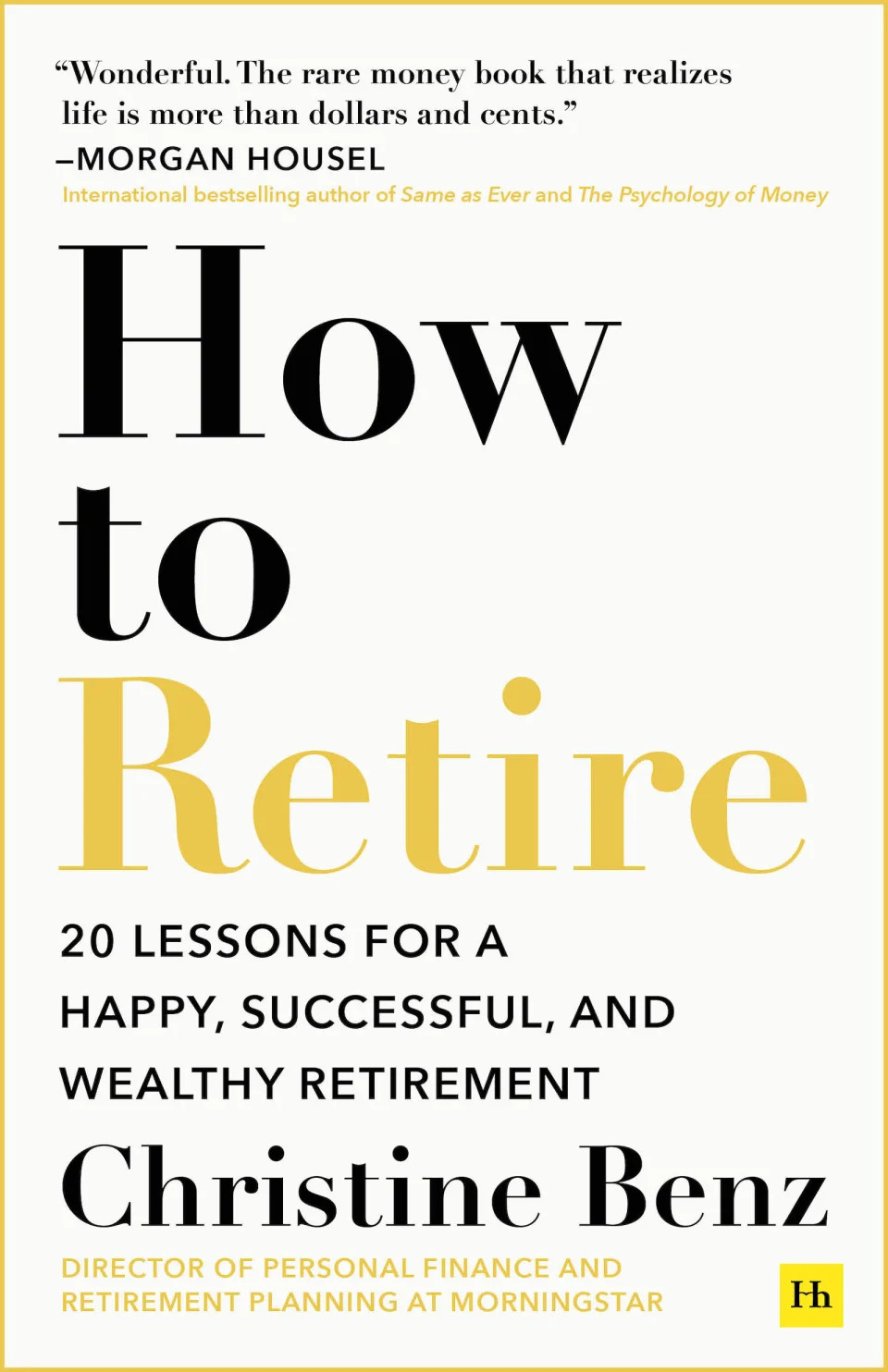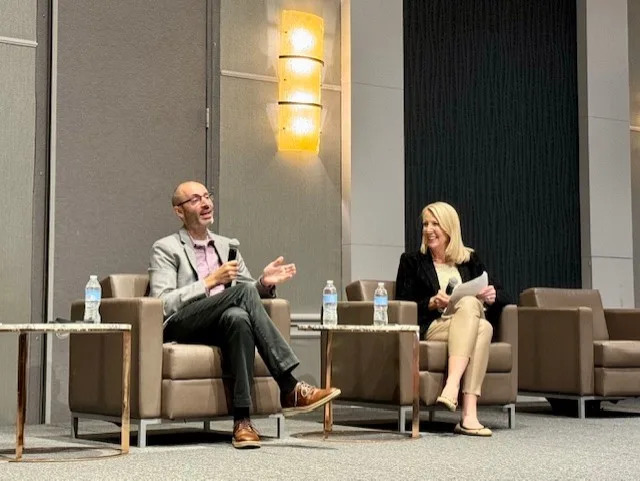News
Q&A: How to retire financially comfortably and regret-free
When Christine Benz’s dad reached his mid-80s, Benz began to notice signs of cognitive decline. She was there to pick up where her dad left off with his finances, starting with his investment accounts and household bills and eventually managing in-home caregiving.
That experience sent her on a path to learn more about retirement planning and share that advice with others.
Benz, the director of personal finance and retirement planning for Morningstar, is the author of a new book " How to Retire: 20 Lessons for a Happy, Successful, and Wealthy Retirement ."
"One of the most heartening aspects of my work has been realizing that I don’t have to figure out everything on my own," she writes. "That’s because there are deep wells of information on various aspects of retirement planning all over the place."
Benz asked 20 retirement experts to go deep on a single lesson that they believe contributes to success in retirement. They include tax planning expert Ed Slott ; Social Security sherpa Mary Beth Franklin ; David Blanchett , head of retirement research at PGIM DC Solutions, who digs into how your spending might change in retirement; and Dr. Jordan Grumet , author of "Taking Stock: A Hospice Doctor’s Advice on Financial Independence, Building Wealth, and Living a Regret-Free Life," which explores living a life that leaves you with no regrets.
Each chapter is a lesson about how to manage some angle of retirement.
Here's what Benz had to say about the secrets to a healthy, happy, and wealthy retirement, edited for length and clarity:
Kerry Hannon: How to retire is a pretty broad topic, Christine. Why is this book important to you right now?
Christine Benz: There are so many different dimensions of the decision about whether and when and how to retire. In my investigation of the topic and my work at Morningstar, I've realized that yes, the financial piece is an important component of it, but so is the non-financial dimension — the question of your purpose later in life, your ability to maintain relationships. I wanted to create a book that brought all of those different variables together in one place to get people to step away from retirement planning as a math problem — something to tackle with spreadsheets and, and calculators. You do need those things, but also to think about your quality of life and what brings you joy.

How did your experience with your parents impact your vision of retirement planning?
I was lucky that I was very close to my parents, so I was able to observe retirement side-by-side with them. I was also able to observe that retirement is very much a process and a series of phases. In their early years of retirement in their 60s, they did a lot of travel. And then as they moved through retirement, their schedule slowed down. In their later years, both of my parents experienced cognitive decline. And so we went through hiring caregivers for them in their home. I was able to see that it's important to plan for all of those phases to the extent that you can and the implications for housing and healthcare.
Can you share a couple of the key concepts you want your readers to take away?
One thing that sticks with me is the value of relationships when it comes to human happiness. Laura Carstensen, professor of psychology at Stanford University, where she is founding director of the Stanford Center on Longevity, was the main interview I did on that topic.
Laura's point is that as we age, our social networks do winnow down a little bit, and we cast off relationships that perhaps are peripheral. So a key takeaway is just being thoughtful about maintaining relationships.
Michael Finke, a professor of wealth management at The American College of Financial Services, had some great stuff about the value of purpose. It's probably not great to go into retirement with this idea that it's going to be this extended vacation, he said. One takeaway from the conversation with Michael is the value of balance. If you can spend part of your day doing something that brings you purpose, then you will enjoy your relaxation that much more.
Any financial guidance that jumped out at you?
Wade Pfau’s work on how we're all geared a little bit differently with respect to what we're looking for in terms of our financial plan in retirement. He hones in on your retirement income personality. For example, I've been someone who has always worked in the context of an employer where I've had a regular paycheck. When I think about my retirement plan, I want a consistent paycheck. And that would point to me being a good candidate for perhaps some type of an annuity product that, at least for my baseline expenses, will provide an amount similar to what I had while I was working. For other people, they may say, well, I'm comfortable with some variability in my paycheck.

I love your holistic look at retirement. People get so focused on the amount they need to have saved, and study after study reveals people panicking that they don't have enough money. Can you share some thoughts on that?
In my interactions with older adults and people approaching retirement, or in retirement, my sense is that they very much concentrate on their finances. There's kind of a badge of honor. I think that people feel, if they've been good savers, that they have more than enough for retirement.
But it's valuable to step back and think about what are the things that will constitute your quality of life in retirement? What are your relationships? Where are you getting your sense of purpose? What's your family situation like?
I loved Jordan’s conversation as kind of a capstone for this, whereas you embark on this next phase of life, think about the things that you, in hindsight, wish you had tried during your lifetime. Now's the time when you're healthy, and have more free time to maybe dip your toe into some of those things. Think of this phase of life as a way to address some of those opportunities that you didn't have time to address while you were working.
What really trips people up when you talk about retirement planning with them?
Giving yourself permission to spend from your portfolio. I know that that is a very difficult transition. I would put myself in the same camp. Your identity may be as a disciplined person, as a saving person. Flipping that switch to fully enjoy the fruits of your labor is not easy. And so we talked about various tips and tricks to help people get over that hump where they're spending an appropriate amount. The early retirement years are the years to hit it in terms of spending activities.
It may necessitate you spending a little bit more than you're comfortable with in those early years, but you don't know what the future holds. You really do need to seize the day, especially if you're feeling well and you have the time in your early years of retirement. That may mean loosening up the pocketbook a little bit, but it’s a mental hurdle that people run into.
Kerry Hannon is a Senior Columnist at Yahoo Finance. She is a career and retirement strategist, and the author of 14 books, including " In Control at 50+: How to Succeed in The New World of Work" @kerryhannon .
Read the latest financial and business news from Yahoo Finance

